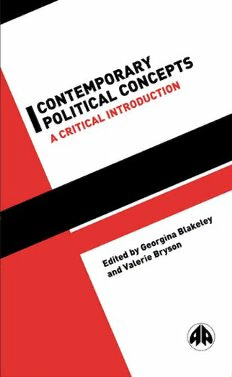
Contemporary Political Concepts: A Critical Introduction PDF
235 Pages·2002·1.371 MB·English
Most books are stored in the elastic cloud where traffic is expensive. For this reason, we have a limit on daily download.
Preview Contemporary Political Concepts: A Critical Introduction
Description:
The language of political debate and analysis has changed dramatically in recent years. Today, both academics and practitioners have largely abandoned the vocabulary of the left and replaced it with a set of concepts that structure debate and set the political agenda. Thus, the world economy is discussed in terms of globalization instead of international capitalism, analysis of the capitalist state has given way to the study of governance, and gender and ethnicity are treated as more significant dimensions of inequality than class. Moreover, the apparently benign concepts of civil society, citizenship and stakeholder have replaced those of class and class conflict, poverty is about social exclusion rather than exploitation, and consumer choice and worker empowerment have replaced the pursuit of class interests. In today's political climate, socialism is seen as old-fashioned or utopian. In contrast, capitalism is seen as realistic, and the 'third way' is presented as the solution to all our ills.This book explores the real issues behind these catchphrases of modern politics, explaining what they mean, and offering a critique of the ideology of which they are a part. With chapters written by experts in each field, this is an excellent guide for students of politics, and anybody who is looking for a critical introduction to the key ideas, so often shrouded in rhetoric, that we hear about in the news. Chapters cover postmodernism, gender, citizenship, civil society, stakeholding, globalization, governance, the Third Way, ethnicity, social exclusion, empowerment and sustainable development.
See more
The list of books you might like
Most books are stored in the elastic cloud where traffic is expensive. For this reason, we have a limit on daily download.
